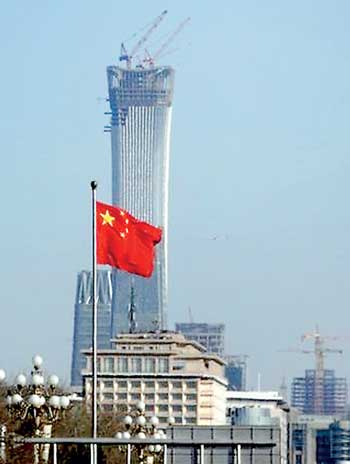Wednesday Feb 25, 2026
Wednesday Feb 25, 2026
Thursday, 28 December 2017 00:00 - - {{hitsCtrl.values.hits}}
BEIJING (Reuters): Chinese industrial firms continued to ramp up production in the fourth quarter, a private survey on Wednesday showed, but growth in wages and hiring slowed in a further sign of cooling momentum in the world’s second-biggest economy.
The quarterly survey of thousands of Chinese firms by China Beige Book International (CBB) showed “old economy” firms in the commodities sector sustained an increase in net capacity and production.
Overall, wages and hiring ebbed in the December quarter, with the retail sector suffering the biggest blow on weak revenue, a hiring slowdown and worsening cash flow.
The results reinforce views that China’s economy will slacken in 2018 after posting better-than-expected 6.9 percent growth through the first-three quarters of this year in the run-up to a key meeting of the ruling Communist Party.
For much of this year activity was supported by robust exports and a construction boom, thanks to a government-led infrastructure spending spree. But a relentless crackdown on debt risks has started to weigh on the economy.
“If you expect a noticeable slowdown in 2018, the first post-Congress returns support those expectations,” CBB said of its fourth quarter findings.
Performance in the retail sector lagged that of other industries, the survey showed, despite Beijing’s efforts to restructure growth towards domestic consumption from years of overreliance on exports and credit-intensive investment.
Authorities are in the second year of an extended campaign to foster sustainable growth by reducing high levels of debt across the economy, particularly targeting speculative lending in the financial sector and the housing market.
While fourth quarter corporate borrowing fell from the third, and banks sold fewer ‘shadow banking’ investment products, average lending rates fell for a second quarter in a row, CBB said, underscoring the mixed results from the deleveraging process.
CBB highlighted weakness in the auto retail segment, where growth is slowing from a high base, while apparel and luxury goods saw rapid inventory growth, which could point to future weakness.
The fourth quarter survey again showed little evidence of supply-side reform, with industrial commodity firms adding net capacity and ramping up production, as well as boosting their payrolls.
Beijing said last week that it will push forward structural supply-side reform that saw outdated capacity taken offline, including surpassing a target for cutting 50 million tonnes of steel capacity this year.
Commodity firms added net capacity for the last seven quarters, according to the CBB survey, in line with official data showing rising output in many sectors.
CBB also said that China will not export inflation into the global economy as sales prices are slowing and commodities prices are unlikely to extend their current upward trajectory.